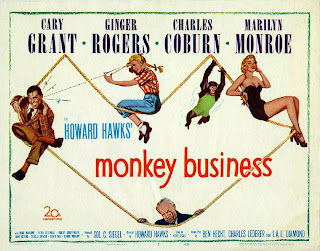Werth: Hey, Wise, can you spare a dime?
Wise: Oh, gee, Werth, I don't typically carry change. It's a plastic society, you know.
Werth: Save your explanations, Wise. I was referring to the anthem of the Great Depression with lyrics by the great E. Y. Harburg. With Lawless opening this Friday, I've been nostalgic for the Hollywood classics made in the decade after the 1929 stock market crash. Americans struggled with wild unemployment, severely reduced incomes and homelessness and longed for an escape from the world of Hoovervilles and soup kitchens.
One of the easiest places for people to go to forget about their troubles, was their local movie theater. Everyday stories of fearless heroes and glamorous heroines unspooled for an audience hungry for distraction—all for the price of one quarter.
Wise: The Gay Divorcee (1934) eschews the realities of the Great Depression almost entirely and instead presents a romanticized version of life among the jet set. After being abandoned by her geologist husband, Mimi Glossop (Ginger Rogers) heads to England where she seeks the advice of her serially married aunt on how best to obtain a divorce. Aunt Hortense (Alice Brady) calls upon her bumbling lawyer Egbert Fitzgerald (the ever delightful Edward Everett Horton) who schemes to have Mimi caught in a staged affair, only to have the plan go awry when Mimi mistakes besotted dance man Guy Holden (Fred Astaire) for the gigolo.
After a series of mistaken identities, sudden reversals and transcendent dance numbers, the missing geologist is revealed to be a cad and Mimi can guiltlessly dissolve that failed marriage and embark on a happier union with Guy.
Werth: I think all divorce proceedings should require a tap number.
Wise: Of course the plot is littered with roadblocks just to allow the audience the pleasure of witnessing Mimi and Guy fall in love. Mimi's reluctance and Guy's persistence is beautifully realized in their duet to Cole Porter's "Night and Day."

Choreographed by Astaire and longtime collaborator Hermes Pan, the number exemplifies what made Depression-era audiences clamor for the Astaire/Rogers dance team: his elegance and crack precision; her insight that acting while dancing was just as important as during the dramatic bits. It's a seduction as poetic as it is erotic, leaving both Mimi and the audience shuddering with pleasure.
Werth: Shuddering with pleasure. Sounds like a shaky Newport cigarette ad.
Wise: Perhaps the most delightful, non-Astaire/Rogers number in the film is Betty Grable's flirtation in song "Let's Knock Knees." In pursuit of Horton's prissy Egbert, she leads the chorus of beach goers in a spirited novelty dance that showcases both her tap dancing chops and Horton's finely honed comic persona. In real life, it would be a ridiculous pairing, but in the fantasy world of the silver screen, it somehow makes sense that a dithering, old-maidish man would fall for a teenage, platinum blonde hoofer.
Werth: Happens in Hollywood real life. Just ask Kelsey Grammer.
Wise: But that's all part of why these Hollywood fantasies work: an ordinary-looking fellow like Fred Astaire could have an extraordinary talent that elevates him to a world just beyond the grasp of the everyday, transporting audiences away from their cares and toward a glittering Art Deco place in the imagination.
Werth: From the opening number of Gold Diggers of 1933, you'd think director Mervyn LeRoy was also shooting for some cinematic escapism from the troubles of the breadline. Ginger Rogers (boy, that girl got around), all fresh-faced and spunky sings "We're in the Money" while a bevy of finely coiffed chorus girls dance around her holding giant coins in skimpy Orry-Kelly costumes blinged out with enough change to excite all of New York's panhandlers. But the number is rudely interrupted by a group of policemen who close down the rehearsal and the show because the producer can't pay his bills.
Wise: Could that please happen to The Client List?
Werth: Ginger is out on the street, and her pals—Carol (Joan Blondell who would have celebrated her 106th birthday this week), Trixie (Fanny Brice wannabe Aline MacMahon), and Polly (Ruby Keeler)—are all worried where their next dollar is going to come from as they share one dress and steal milk from across the breezeway for breakfast. But this is a musical, so of course they can't wind up hooking it on the corner or living in a Hooverville. Cigar-chomping producer Barney (Ned Sparks) has an idea for a show and all he needs is the money to put it up.
Luck would have it that the next door neighbor, Brad (gooey-toned Dick Powell), is a wildly talented composer who also happens to be a secret blue-blood to boot. So the money appears, everyone gets a part in the show—
Wise: —and they all live happily ever after.
Werth: After the requisite mistaken identities, romantic hijinx, Guy Kibbee mugging and lavish, kaleidoscopic Busby Berkeley dance numbers, yes. But along the way, the poor showgirls get the upper hand on the upper crust, and the finale, "Remember My Forgotten Man" gives the audience a touching reminder of the real world that escapist fantasies like Gold Diggers were trying to help them escape from.
Wise: I guess with fantasies about superheroes, plucky archers and foul-mouthed teddy bears, Hollywood is still using escapist fare to help us forget our current financial woes.
Werth: As long as they don't help our readers forget next week's Film Gab.

























